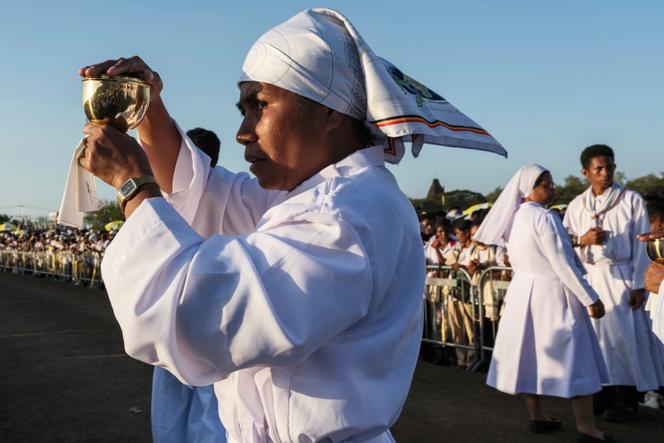


With a population of 1.3 million, East Timor is a very small country. But when half the population is gathered in just a few hectares, it's no less impressive. On Tuesday, September 10, some 600,000 people, according to local authorities, said "Amen" in unison, to Pope Francis who had come to celebrate a historic mass in this young democracy, 97% of whose inhabitants claim to be Catholic. Facing the Argentine pope, a sea of yellow and white umbrellas, the Vatican colors, protected the crowd dressed in T-shirts bearing his effigy from the blazing sun. Some had arrived during the night to be in the front row. Gathered in an open area in Tasitolu, a seaside village to the west of the capital Dili, the Timorese were able to devote themselves fully to the pontiff's arrival: The state had decreed three public holidays for the occasion.
On the road leading to the rally, every store and business had its own billboard celebrating the arrival of the head of the Catholic Church, while a human tide made its way to the venue. "I'm thrilled, really happy," said 34-year-old Federico, wearing large iridescent sunglasses. "Everyone's excited: It's the first time the pope has come to East Timor," said the young man. Legally, he's right: When John Paul II presided over a mass in the same place in 1989, East Timor was still an Indonesian province. The pope's visit was a message of hope for an oppressed people and a way of putting pressure on Indonesia, which had invaded the territory after the Portuguese colonizer withdrew in 1975.
Today, it is seen as recognition for a state that only gained official independence in 2002, three years after the departure of Indonesian troops, who had left the country in ruins. On Monday, September 9, the pope called on the country to continue along the path of reconciliation: "In this regard, I wish in particular to recall and commend your assiduous efforts to achieve full reconciliation with your brothers and sisters in Indonesia, an attitude that found its first and purest source in the teachings of the Gospel." For such a recent conflict, relations with Indonesia are indeed calmer: Many Timorese study or work in Indonesia and, on Tuesday, groups of Catholics came from Indonesian Timor, the western half of the island, to take part in the mass.
However, there are those who criticize a forced rapprochement. "Friendship with the Indonesian people is a good thing, but it must not come at the cost of collective amnesia: The state imposes it because it benefits the business community but the younger generations no longer know the history and you can read a lot of misinformation on social media, claiming that Indonesian colonization was a good thing," said Fernando Ximenez, a 28-year-old activist who was present on Tuesday. In 24 years, the Indonesian occupation is estimated to have claimed the lives of between 100,000 and 200,000 people, who were either massacred or deliberately starved.
You have 58.62% of this article left to read. The rest is for subscribers only.
